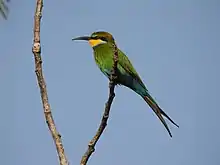| Swallow-tailed bee-eater | |
|---|---|
.jpg.webp) | |
| M. hirundineus hirundineus Tswalu Kalahari Reserve, South Africa | |
.jpg.webp) | |
| M. hirundineus chrysolaimus Senegal | |
| Scientific classification | |
| Domain: | Eukaryota |
| Kingdom: | Animalia |
| Phylum: | Chordata |
| Class: | Aves |
| Order: | Coraciiformes |
| Family: | Meropidae |
| Genus: | Merops |
| Species: | M. hirundineus |
| Binomial name | |
| Merops hirundineus Lichtenstein, AAH, 1793 | |
| Synonyms | |
| |
_juvenile.jpg.webp)

The swallow-tailed bee-eater (Merops hirundineus) is a near passerine bird in the bee-eater family, Meropidae.
Description
This species, like other bee-eaters, is a richly coloured, slender bird. Its colours and readily visible forked tail make it unmistakable. It is mainly green with a yellow throat, blue gorget and black eye stripe and beak. It can reach a length of 20–22 cm, including the long forked green or blue feathers. Sexes are alike.[2]
Distribution and habitat
It breeds in savannah woodlands of sub-Saharan Africa. It is partially migratory, moving in response to rainfall patterns. This is a species which prefers somewhat more wooded country than most bee-eaters.
Behaviour
This attractive bird is readily approached. Just as the name suggests, bee-eaters predominantly eat insects, especially bees, wasps and hornets, which are caught in the air by sorties from an open perch. The swallowtail has a preference for honeybees.[2]
These bee-eaters nest as pairs or in very small colonies in sandy banks, or similar flat ground. They make a relatively long tunnel in which the 2 to 4 spherical, white eggs are laid. They also feed and roost communally.[2]
References
- ↑ BirdLife International (2016). "Merops hirundineus". IUCN Red List of Threatened Species. 2016: e.T22683702A92996665. doi:10.2305/IUCN.UK.2016-3.RLTS.T22683702A92996665.en. Retrieved 11 November 2021.
- 1 2 3 Fry, H.; Boesman, P.F.D. (2020). Del Hoyo, Josep; Elliott, Andrew; Sargatal, Jordi; Christie, David; De Juana, Eduardo (eds.). "Swallow-tailed Bee-eater (Merops hirundineus)". Birds of the World. Cornell Lab of Ornithology. doi:10.2173/bow.stbeat1.01. S2CID 216191523. Retrieved 18 January 2022.
{{cite journal}}: CS1 maint: multiple names: authors list (link)
External links
- Swallow-tailed bee-eater - Species text in The Atlas of Southern African Birds.
